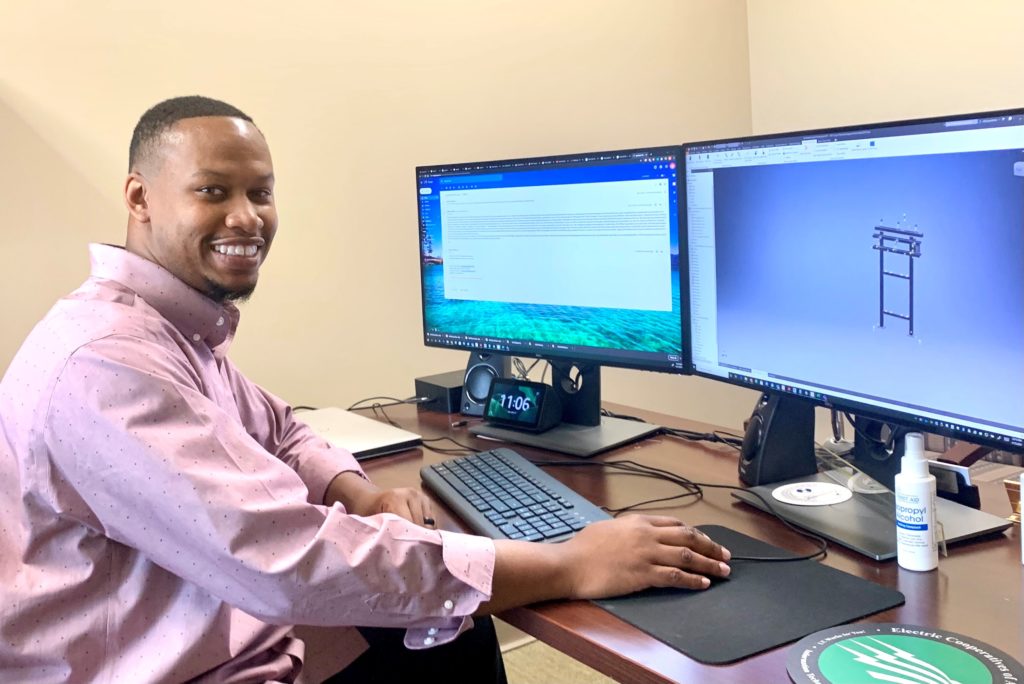
Adriel Paradise, an engineer at an electric cooperative, didn’t grow up dreaming about a career in the utility industry. As a boy in Little Rock, Arkansas, he, his brother and their father, a mechanical technician, tinkered on a 1972 Plymouth Duster they had converted into a race car. If they weren’t fine-tuning the car’s 700 horsepower engine, they were racing it at local tracks.
“I was walking around at the age of 11 and 12 talking about being an engine builder,” said Paradise, 33, a substation engineer at Arkansas Electric Cooperative Corp. in Little Rock. Electric utility careers are “something you don’t think about. We drive by substations and electrical lines all the time, but we don’t necessarily think, ‘Oh, that is a place for a career.’”
Now, Paradise is entering his eighth year as an engineer at a generation and transmission co-op, first at KAMO Power in Vinita, Oklahoma, and now at AECC. And he’s doing what he can to raise the profile of careers in the energy industry among college students as a mentor in a program at Jackson State University, a historically Black college (HBCU) in Mississippi.
The mentoring program is part of the Campus Energy Network, a new initiative by the Center for Energy Workforce Development, the National Utilities Diversity Council and the American Association of Blacks in Energy. Two other colleges in the network are Cal Poly Pomona in California, in conjunction with the Society of Hispanic Professional Engineers, and Spelman College in Atlanta.
The energy industry’s stability, increasing focus on technology and opportunities for advancement are huge selling points that need to be highlighted, said Julie Strzempko, a consultant for CEWD.
“These jobs are sustainable throughout an individual’s career,” she said. “You don’t need to hop companies every few years to get a promotion. You can start as a lineworker today and end up as a CEO in 30 years and you’ll get that training. I think a lot of young people are looking for that, having seen what their parents and older siblings went through at difficult times in the economy.”
Fifteen JSU engineering majors are participating in the first 10-week program. Mentors come from investor-owned utility Entergy and AECC. Paradise is one of two AECC mentors. The other is Maria Bunting Smedley, vice president of human resources and corporate strategy, who recommended JSU.
“The partnership is a high-level and unique opportunity to ensure that our students are aware, confident and ready for exciting careers in the energy sector,” said Wilbur Walters, dean of JSU’s College of Science, Engineering and Technology.
Five teams of mentors and students meet regularly. Paradise and his fellow mentor, an Entergy engineer, plan to discuss “soft skills,” such as networking, interviewing and office etiquette.
“I’d say my job interviews have been 25% technical and 75% relational,” said Paradise. “Employers are trying to figure out whether you’ll be a good fit on your team. How do you handle conflicts and are you going to work for the success of the whole team? And are you willing to grow and learn?”
The Campus Energy Network is currently a pilot program, but CEWD has already identified several measures of success. They’re aiming for a 15% increase in applications from JSU students for summer internships at energy companies and have set benchmarks at the other two colleges.
Paradise said he was “honored” to be part of CEN’s first mentor group. “Whether it’s inspiration or direct knowledge in terms of the work and the career field that I can pass on…it’s a blessing to be involved.”
Victoria A. Rocha is a staff writer at NRECA.